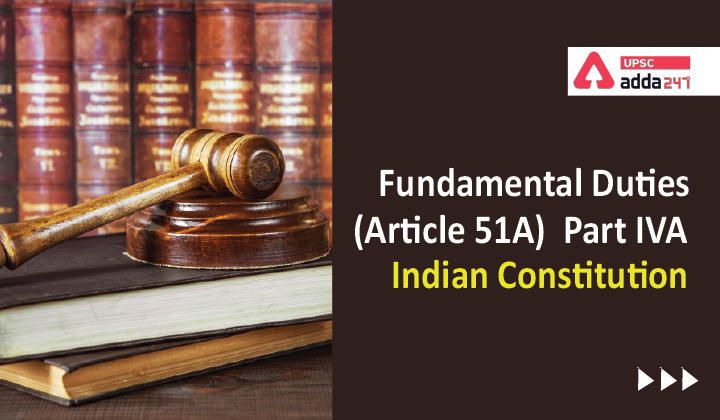Table of Contents
भारतीय संविधान में मौलिक कर्तव्यों का समावेश 42वें संविधान संशोधन अधिनियम, 1976 के तहत किया गया था, जो भाग IV-ए में अनुच्छेद 51ए के तहत स्थित हैं। मौलिक कर्तव्यों को संविधान में सम्मिलित करने का उद्देश्य नागरिकों के नैतिक और नागरिक कर्तव्यों को बढ़ावा देना और समाज में एक जिम्मेदार नागरिक के रूप में उनके आचरण को सुनिश्चित करना था। प्रारंभ में इनकी संख्या 10 थी, लेकिन 86वें संविधान संशोधन अधिनियम, 2002 के माध्यम से एक और कर्तव्य जोड़ा गया, जिससे अब मौलिक कर्तव्यों की कुल संख्या 11 है।
मौलिक कर्तव्य (अनुच्छेद 51ए)
मौलिक कर्तव्य के बारे में: मौलिक कर्तव्य (अनुच्छेद 51ए) मूल रूप से भारतीय नागरिकों पर देशभक्ति की भावना को प्रोत्साहित करने एवं भारत की एकता को अक्षुण्ण बनाए रखने हेतु नैतिक दायित्व (विधिक नहीं) हैं।
42वां संविधान संशोधन: 42वें संविधान संशोधन अधिनियम, 1976 द्वारा दस मौलिक कर्तव्यों (अनुच्छेद 51ए) को संविधान में समाविष्ट किया गया।
भाग IV- ए: 42वें संविधान संशोधन अधिनियम, 1976 ने संविधान में भाग IV- ए स्थापित किया जिसके अंतर्गत सभी मौलिक कर्तव्यों को सूचीबद्ध किया गया है।
86वां संविधान संशोधन: 11वें मौलिक कर्तव्य को बाद में 2002 के 86वें संशोधन अधिनियम द्वारा सूची में समाविष्ट किया गया।
स्वर्ण सिंह समिति: मौलिक कर्तव्यों (अनुच्छेद 51ए) को संविधान में स्वर्ण सिंह समिति की संस्तुतियों के आधार पर समाविष्ट किया गया था।
स्रोत: भारतीय संविधान में मौलिक कर्तव्य (अनुच्छेद 51ए) की उत्पत्ति तत्कालीन सोवियत संघ के संविधान से हुई है।
मौलिक कर्तव्य (अनुच्छेद 51ए)- मौलिक कर्तव्यों की सूची
| संवैधानिक अनुच्छेद | प्रावधान |
| अनुच्छेद 51 ए (ए) | संविधान का पालन करना तथा उसके आदर्शों एवं संस्थाओं, राष्ट्रीय ध्वज एवं राष्ट्रगान का सम्मान करना। |
| अनुच्छेद 51 ए (बी) | स्वतंत्रता हेतु हमारे राष्ट्रीय संघर्ष को प्रेरित करने वाले महान आदर्शों को संजोना एवं उनका पालन करना। |
| अनुच्छेद 51 ए (सी) | भारत की संप्रभुता, एकता एवं अखंडता को अक्षुण्ण बनाए रखने तथा उसकी रक्षा करना। |
| अनुच्छेद 51 ए (डी) | देश की रक्षा करना एवं ऐसा करने के लिए बुलाए जाने पर राष्ट्रीय सेवाएं प्रदान करना। |
| अनुच्छेद 51 ए (ई) | भारत के सभी लोगों के मध्य धार्मिक, भाषाई, एवं क्षेत्रीय या वर्गीय विविधताओं से परे सद्भाव एवं समान बंधुत्व/भ्रातृत्व की भावना को प्रोत्साहित करना; महिलाओं के सम्मान के प्रति अपमानजनक प्रथाओं का त्याग करना। |
| अनुच्छेद 51 ए (एफ) | हमारी सामासिक (मिली-जुली) संस्कृति की समृद्ध विरासत को महत्व देना एवं उसका संरक्षण करना। |
| अनुच्छेद 51 ए (जी) | वनों, झीलों, नदियों एवं वन्य जीवन सहित प्राकृतिक पर्यावरण को महत्व देना, उसकी रक्षा करना एवं उसमें संवर्धन करना तथा प्राणी मात्र (जीवित प्राणियों) के प्रति दया भाव रखना। |
| अनुच्छेद 51 ए (एच) | वैज्ञानिक दृष्टिकोण, मानववाद एवं ज्ञानार्जन तथा सुधार की भावना विकसित करना। |
| अनुच्छेद 51 ए (आई) | सार्वजनिक संपत्ति की रक्षा करना एवं हिंसा से दूर रहना। |
| अनुच्छेद 51 ए (जे) | व्यक्तिगत एवं सामूहिक गतिविधियों के सभी क्षेत्रों में उत्कृष्टता की दिशा में सतत प्रयास करना ताकि राष्ट्र निरंतर प्रयास एवं उपलब्धि के उच्च स्तर तक पहुंचे। |
| अनुच्छेद 51ए (के) | छह से चौदह वर्ष की आयु के मध्य, जैसा भी मामला हो, अपने बच्चे को शिक्षा के अवसर प्रदान करने हेतु माता-पिता अथवा अभिभावक का कर्तव्य। |
मौलिक कर्तव्य (अनुच्छेद 51ए)- प्रमुख विशेषताएं
मौलिक कर्तव्यों की प्रकृति: मौलिक कर्तव्य मूल रूप से नागरिकों पर नैतिक एवं नागरिक दायित्व हैं एवं विधिक (कानूनी) रूप से गैर-बाध्यकारी प्रकृति के हैं। उदाहरण के लिए: अनुच्छेद 51 ए (बी) के अंतर्गत स्वतंत्रता संग्राम के महान आदर्शों को संजोना एक नैतिक नीति वचन है। अनुच्छेद 51 ए (ए) के अंतर्गत संविधान, राष्ट्रीय ध्वज एवं राष्ट्रगान का सम्मान करना एक नागरिक कर्तव्य है।
मौलिक कर्तव्यों का दायरा: मौलिक कर्तव्य केवल भारत के नागरिकों पर लागू होते हैं एवं विदेशियों पर लागू नहीं होते हैं।
किसी न्यायालय में वाद योग्य नहीं: संविधान न्यायालयों द्वारा मौलिक कर्तव्यों को प्रत्यक्ष रूप से लागू करने का प्रावधान नहीं करता है। इसलिए, मौलिक कर्तव्य विधि के न्यायालय में गैर-वाद योग्य हैं।
मौलिक कर्तव्यों का महत्त्व
लोकतांत्रिक आचरण का निरंतर अनुस्मारक: मौलिक कर्तव्यों का उद्देश्य प्रत्येक नागरिक को लगातार यह स्मरण दिलाना है कि संविधान ने उन्हें कुछ विशेष मौलिक अधिकार प्रदान किए हैं, लेकिन इसके साथ ही नागरिकों को लोकतांत्रिक आचरण और मूल्यों का पालन करना भी आवश्यक है।
असामाजिक गतिविधियों के विरुद्ध चेतावनी: मौलिक कर्तव्य उन लोगों के लिए चेतावनी के रूप में कार्य करते हैं जो असामाजिक गतिविधियों में संलिप्त रहते हैं, जैसे राष्ट्रीय ध्वज का अपमान करना, सार्वजनिक संपत्ति को नष्ट करना या शांति भंग करना। यह नागरिकों को जिम्मेदार बनाता है और असामाजिक गतिविधियों के प्रति उन्हें सावधान करता है।
अनुशासन और प्रतिबद्धता की भावना: मौलिक कर्तव्य नागरिकों में राष्ट्र के प्रति अनुशासन और प्रतिबद्धता की भावना को मजबूत करते हैं। ये नागरिकों को केवल दर्शक न बनाकर, उनकी सक्रिय भागीदारी से राष्ट्रीय लक्ष्यों की प्राप्ति में सहयोगी बनने के लिए प्रेरित करते हैं।
कानून की संवैधानिकता निर्धारित करने में सहायता: मौलिक कर्तव्य कानून की संवैधानिकता का निर्धारण करने में न्यायालय की भी सहायता करते हैं। उदाहरण के लिए, यदि विधायिका द्वारा पारित कोई कानून मौलिक कर्तव्यों के तत्वों का पालन करता है, तो न्यायालय इसे उचित और संवैधानिक मान सकता है।
मौलिक कर्तव्य (अनुच्छेद 51ए)- यूपीएससी परीक्षा हेतु प्रासंगिकता
यूपीएससी परीक्षा के लिए मौलिक कर्तव्य अत्यंत प्रासंगिक हैं, विशेषकर जीएस पेपर 2 के तहत, जहां संविधान की संरचना, इसके प्रावधानों एवं विकास को समझना आवश्यक है। मौलिक कर्तव्य लोकतांत्रिक आचरण और नागरिक जिम्मेदारियों पर जोर देते हैं।
| Related Articles | |
| भारत के राष्ट्रपति का वीटो पावर | भारतीय संविधान और उनके स्रोत |
| मूल अधिकारों की सूची | राज्य के नीति निदेशक तत्व |



 TSPSC Group 1 Question Paper 2024, Downl...
TSPSC Group 1 Question Paper 2024, Downl...
 TSPSC Group 1 Answer key 2024 Out, Downl...
TSPSC Group 1 Answer key 2024 Out, Downl...
 UPSC Prelims 2024 Question Paper, Downlo...
UPSC Prelims 2024 Question Paper, Downlo...
